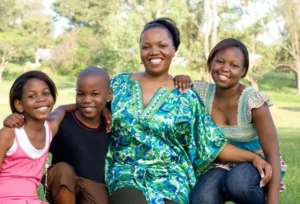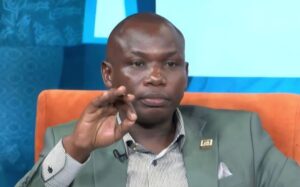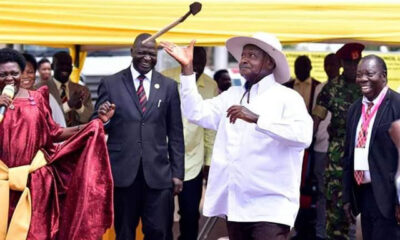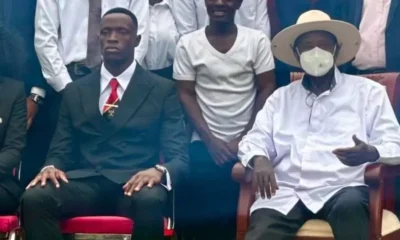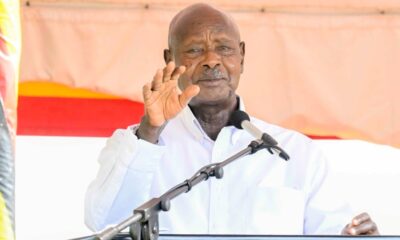News
President Yoweri Museveni Fast Facts
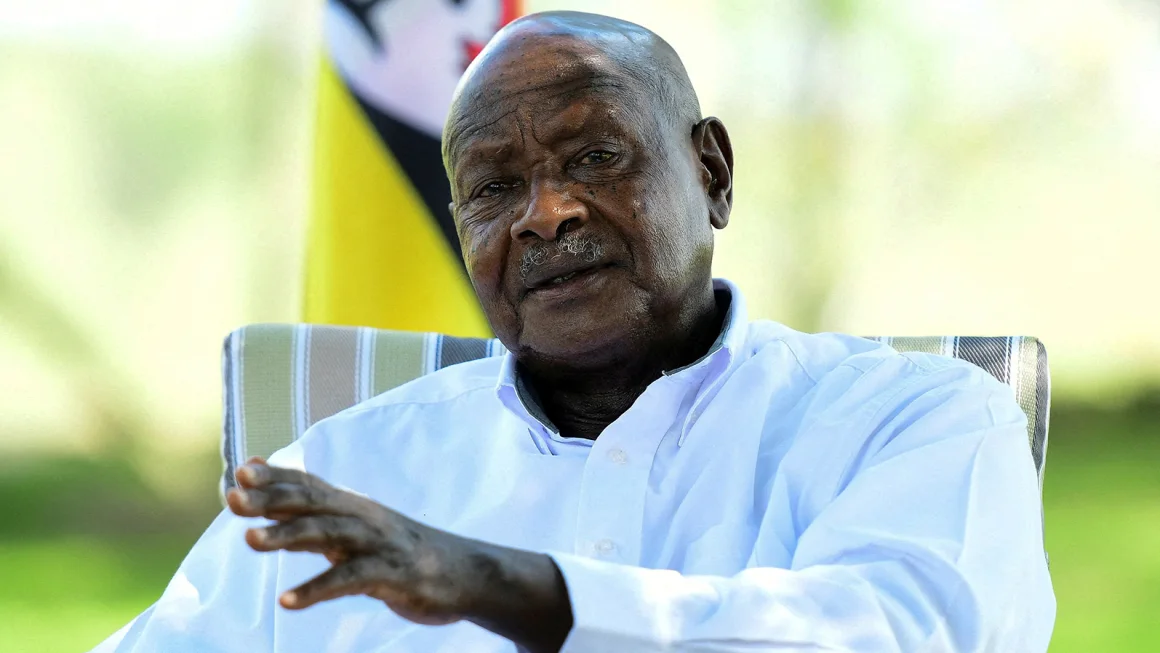
Here is a look at the life of Yoweri Museveni, president of Uganda since 1986.
Personal
Birth date: August 15, 1944
Birth place: Ntungamo, Uganda
Birth name: Yoweri Kaguta Museveni
Father: Amos Kaguta, a cattle keeper
Mother: Esteri Kokundeka
Marriage: Janet (Kataaha) Museveni (August 1973-present)
Children: one son, Muhoozi Kainerugaba, three daughters
Education: Dar Es Salaam University (Tanzania), B.A., Economics, 1970
Religion: Christian
Timeline
1970 – Returns to Uganda after college and works for Prime Minister Milton Obote.
January 25, 1971 – Goes into exile in Tanzania when Obote is overthrown by Idi Amin. While in Tanzania, forms the Front for National Salvation (FRONASA) with the purpose of overthrowing Amin.
April 1979 – FRONASA overthrows Amin and Museveni takes a position on the Military Commission, the newly formed government of Uganda.
1979-1980 – Minister of Defense, Uganda.
1981-1986 – Guerilla leader (National Resistance Army) in Uganda.
January 26, 1986 – Becomes president of Uganda after ousting the military regime of General Tito Okello. Is sworn in January 29.
May 1996 – Is elected president of Uganda with 74.2% of the vote in the first direct presidential election in Uganda since independence from Britain in 1962.
March 24, 1998 – US President Bill Clinton meets with Museveni in Uganda.
March 2001 – Is reelected president of Uganda with 69.3% of the vote.
May 6, 2002 – Meets with US President George W. Bush at the White House to discuss ways to get more Ugandan products into the US market.
July 11, 2003 – Bush meets with Museveni in Entebbe, Uganda, to speak about AIDS.
August 2005 – Uganda’s parliament removes presidential term limits.
February 25, 2006 – Museveni is declared the winner of Uganda’s first multi-party presidential election. It is his third term in office.
August 2006 – The Ugandan government and the Lord’s Resistance Army sign a truce aimed at ending 20 years of civil war in the country. The war has killed tens of thousands and displaced two million people.
October 30, 2007 – Museveni meets with Bush at the White House.
November 2010 – Museveni releases a song and accompanying music video, “U Want Another Rap?” as part of his reelection campaign.
November 29, 2010 – Museveni takes a surprise trip to Somalia, making him the first head of state to visit in almost 20 years, according to the African Union Mission for Somalia.
February 20, 2011 – Uganda’s electoral commission declares Museveni the president with 68% of the vote. It is his fourth term in office.
February 24, 2014 – Museveni signs into law a controversial bill that toughens penalties against gay people and makes some homosexual acts crimes punishable by life in prison. During the bill signing, he declares that he will not allow the West to impose its values on Uganda.
July 31, 2015 – Museveni says he will seek his fifth term as president in 2016 elections, 30 years after assuming the office for the first time.
February 20, 2016 – Uganda’s election commission declares Museveni the winner, with nearly twice as many votes for president as his closest competitor, opposition leader Kizza Besigye. Besigye was put under “preventative arrest” on February 19 at his home in Kampala, along with six officials from his party. Besigye’s party, the Forum for Democratic Change (FDC) rejects the results and demands an independent audit of the elections.
May 12, 2016 – Museveni is sworn in for his fifth term as president.
July 11, 2016 – Facebook photos of Museveni sitting in a lawn chair by the roadside making a phone call in Kyeirumba Village, Uganda, go viral, inspiring an online meme.
July 27, 2018 – A Ugandan constitutional court ruling upholds a December 2017 constitutional amendment to remove the presidential age limit, likely allowing Museveni to rule for life. The article limited anyone from serving as president past the age of 75.
July 24, 2019 – Bobi Wine, a 37-year-old Ugandan pop star, announces he is running against Museveni, who has been in power for 33 years.
August 26, 2019 – A Harvard student sues Museveni for blocking him on Twitter arguing that being blocked has prevented him from giving feedback to the official’s account about government policies on Twitter.
April 9, 2020 – Museveni releases a home workout video in order to encourage Ugandans to stay home during the country’s Covid-19 lockdown.
May 20, 2020 – The High Court in Kampala rules that Museveni and other officials have a right to block people on their private Twitter handles.
January 16, 2021 – Uganda’s election commission declares Museveni the winner of the presidential election. It is his sixth term in office.
May 12, 2021 – Museveni is sworn in for his sixth term as president.
May 29, 2023 – Signs into law one of the world’s strictest anti-gay bills amid Uganda’s intensifying crackdown on LGBTQ people. Museveni had sent the bill back to parliament for revisions in April.
June 8, 2023 – Museveni says on Twitter that he is taking “forced leave” after testing positive for Covid-19 and is experiencing “mild symptoms.”
March 22, 2024 – Appoints son, Muhoozi Kainerugaba, as head of Uganda’s military.
News
Conversation With Uganda’s Student Tech Pioneer: Kusiima Saruah
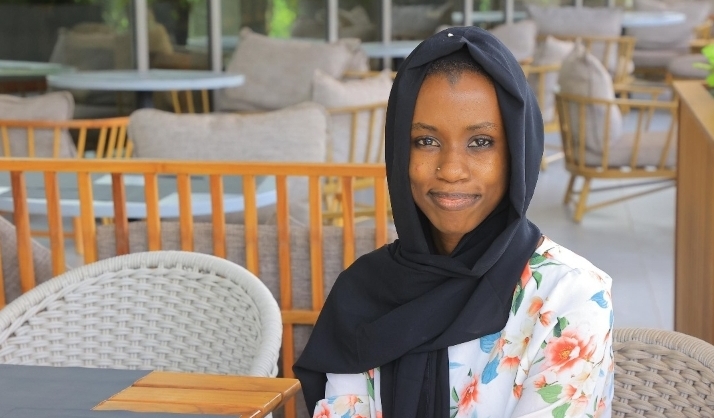
In a country where the youth make up the majority of the population, their voices are often overlooked in critical governance processes. But a bold new wave of innovation led by young minds is reshaping how civic participation and leadership are cultivated, starting right at the grassroots.
One such trailblazer is Kusiima Saruah Kyaligonza, a 21-year-old software developer and university student at Uganda Martyrs University, whose work caught our attention. In a recent conversation with Amiri Wabusimba, Kusiima shared her vision, journey, and the powerful potential of digital platforms to transform Uganda’s democratic future.
Inspired by the challenges she observed in university elections, including voter mistrust, low student participation, and systemic apathy, Kusiima developed a digital voting platform tailored for student elections. She aimed to rebuild faith in electoral processes, beginning within schools. “Watching the university’s elections, I saw the frustration from students.
I wanted to create a space where students feel their voices matter and their votes count,” she explained. “If we instill that mindset early, we raise a generation that demands integrity and leads with purpose.” Her platform addresses specific electoral issues such as vote rigging, low turnout, and favoritism common even in student leadership contests by promoting transparency, fairness, and accessibility.
Kusiima’s work is part of a broader movement of youth-led innovation in Uganda. “We often say the youth are the leaders of tomorrow,” she noted, “but many of us are already leading today through art, technology, advocacy, and innovation. What we need is support, not just applause.” Her initiative has been well received by fellow students, who report feeling empowered, heard, and more engaged in school governance. According to Kusiima, the impact goes beyond elections; it sows seeds of responsible leadership.
Asked whether digital voting could work on a national level, Kusiima responded with conviction. “Yes, it can if we commit to building digital literacy, infrastructure, and, most importantly, trust. Leaders must stop fearing technology and start embracing its potential.” If given a chance to address the Electoral Commission or national leaders, Kusiima says she would urge them to invest in youth innovations and adopt transparent systems that simplify civic participation without compromising credibility.
As Uganda continues to grapple with questions around electoral transparency, declining public trust in democratic institutions, and low youth participation, innovations like Kusiima Saruah’s digital voting platform couldn’t have come at a better time, especially as the country prepares for the 2026 general elections. Her initiative offers more than a technological upgrade, it’s a catalyst for cultural change in how Uganda engages its citizens from an early age. By digitizing trust, simplifying participation, and empowering youth to lead, this platform embodies the future of accountable governance.
This is not just a student project; it’s a national opportunity waiting to be embraced. It is time for Uganda’s government, Electoral Commission, civil society, and development partners to see this for what it is: a smart, scalable, homegrown solution that reflects both the challenges and the aspirations of a new generation.
If Uganda truly seeks to uphold the principles of free and fair elections in 2026 and beyond, then supporting innovations like Kusiima’s is not optional; it is essential.
-
Top Stories2 days ago
Just in: PLU leaning to NRM, Withdraws From Party Primaries With 22 days Remaining to Elections.
-
Top Stories5 days ago
Suspected female suicide bomber killed in Kalerwe
-
Top Stories5 days ago
NUP Clears Kyeyune Pafuladiito For Mubende District Chairperson Race.
-
Top Stories5 days ago
NUP Goes For Buwekula South MP Seat Blesses Edward Ssempira.
-
Top Stories2 days ago
Museveni Approves Flyover Along Kampala-Jinja Highway to Protect Mbalala Industrial Park Workers
-
Top Stories5 days ago
Uganda’s Open Currency Policy and the Decline of the Shilling
-
Top Stories4 days ago
Dr. Ssemugenyi petitions Constitutional Court over UPDF Amendment Act
-
Top Stories2 days ago
Police fire teargas and water cannon at protesters in Kenya as thousands take to the streets


